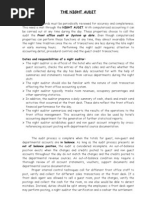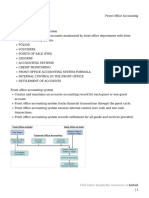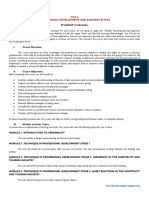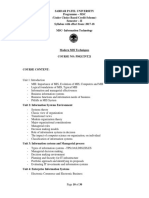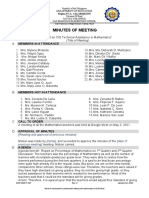Module 1 Week 1 Hpc4
Module 1 Week 1 Hpc4
Uploaded by
Arvie TejadaCopyright:
Available Formats
Module 1 Week 1 Hpc4
Module 1 Week 1 Hpc4
Uploaded by
Arvie TejadaOriginal Description:
Copyright
Available Formats
Share this document
Did you find this document useful?
Is this content inappropriate?
Copyright:
Available Formats
Module 1 Week 1 Hpc4
Module 1 Week 1 Hpc4
Uploaded by
Arvie TejadaCopyright:
Available Formats
SURIGAO DOCTORS COLLEGE
Hospitality Management Program
Course code: HPC4
Course Title: Applied Business Tools and Technologies in Hospitality
Topic Title: Module 1. Front Office Accounting System in Hotel
Lesson 1.1 FRONT OFFICE ACCOUNTING - AN INTRODUCTION
WEEK #: 1
Objectives of this lesson:
After completion of this lesson, the learner will be able to:
Explain the front office guest cycle and related accounting activities- the FO accounting cycle
Explain the importance of front office accounting for guests and the hotel.
Explain the accounting elements and terms commonly used in FO accounting.
1.1 FRONT OFFICE ACCOUNTING - AN INTRODUCTION
INTRODUCTION
A front office accounting system is an essential process designed to monitor and chart the
financial transactions of guests and non-guest at the hotel during each stage of the guest cycle.
An effective guest accounting system includes tasks performed during each stage of the guest cycle:
During the pre-arrival stage of the guest cycle, a guest accounting system captures data
related to the form of guarantee for a reservation, and tracks pre- payment and advance
deposits.
When the guest arrives at the hotel, a guest accounting system documents the application
of room rate and tax at registration.
During occupancy, a guest accounting system is responsible for tracking guest charge
purchase.
During guest checkout, a guest accounting system ensures payment for goods and services
provided.
After guest check out, if a guest’s bill is not fully paid at checkout, the balance is transferred
from guest to non –guest records.
When this occurs, collection becomes the responsibility of the back office accounting division.
Note:
The financial transactions of non-guests may also be processed within the parameters of front
office accounting.
A hotel may allow transactions involving non-guests in order to promote the hotel to local
businesses; to track the unsettled bills of former guests; or to track transactions related to
conference business at the hotel.
1 Prepared by: ARVIE TEJADA
SURIGAO DOCTORS COLLEGE
Hospitality Management Program
So, the specific functions of a front office accounting system (FOAS) are to:
Create and maintain an accurate accounting file for each guest or non-guest account
Track financial transactions throughout the guest cycle
Ensure internal control over cash and non-cash transaction
Obtain settlement for all goods and services provided
The front office’s ability to monitor and chart guest and non-guest transaction will directly affect
its ability to collect outstanding balances. Incomplete of inaccurate monitoring may lead to difficulties in
settlement.
ACCOUNTING FUNDAMENTALS
Importance of Accounting for Front Office:
Being familiar with company procedures and accounting needs and being able to identify
customer needs facilitates efficient work practices and promotes guest satisfaction.
When proper, clear information is provided to guests, it prevents the occurrence of
unpleasant surprises to guests in the form of unexpected charges, etc. that are sure to disturb
them and cause unnecessary arguments and delays, especially at check out.
Also, guest accounts must be updated regularly with charges and adjustments because this
impacts on company profits in the following ways:
Accounts are kept up to date with the minimum of effort. This impact positively on
productivity and efficiency. Less time will be spent trying to find outstanding documents
and dealing with discrepancies.
To minimize the chances of the guest departing before all charges have been posted.
This would save on costs of contacting the guest and losing out on payments especially
with foreign guests.
To reassure guests that their accounts are being managed accurately and efficiently.
A satisfied guest implies repeat business.
Security purposes: to prevent unauthorized access and the tampering of accounts, such as,
the creation of false revenue and fraudulent charges and adjustments to guest accounts.
Inaccurate transactions: The presence of unauthorised persons in one’s work area
increases the risk of inaccurate transactions. Not only will the company suffer from account
imbalances and profit losses, but the guest may be upset at having incorrect charges etc. This
affects guest satisfaction, which in turn affects repeat business.
Personal accountability: Front desk staffs that handle and process guest accounts are
responsible and accountable for computer transactions and for the filing and storage of account
documentation while on duty.
All guest information is confidential: this includes account information, and unauthorised
persons must not be allowed access to such information.
2 Prepared by: ARVIE TEJADA
SURIGAO DOCTORS COLLEGE
Hospitality Management Program
Basic Accounting Terminology:
The design of a front office accounting system is unique to hotel operations. Both, terminology
and report formats, often differ from those of other accounting systems. A brief review of some of the
basic concepts of front office accounting follows.
1. ACCOUNT
An account is a form on which financial data are accumulated and summarized.
An account may be imagined as a bin or container in which the results of various business
transactions are stored.
The increases and decreases in an account are summarized and the resulting monetary amount
is the account balance.
All financial transactions that occur in a hotel affect some account.
Front office accounts are record keeping devices to store information about guest and non-
guest financial transactions.
In its simplest written form, an account resembles the letter T:
Account Name
Charge Payment
For a front office account, charges are increases in the account balance and are entered on the
left side of the T, while payments are decreases in the account balance and are entered on the right
side of the T.
The account balance is the difference between the totals of the entries on the left side and the right
side of the T-account.
A journal form is typically used for front office accounting documents. In a non-automated or semi-
automated recordkeeping system, the journal form might look like:
Description of Charge Payment Balance
Account
In a journal, similar to a T-account, increases in the account balance are entered under charges,
while decreases in the account balance are entered under payments.
In a fully automated system, charges and payments may be listed in a single column with the
amounts of payment placed within parentheses (brackets) to indicate their effect (a decrease) on the
account balance or a positive amount depicting a debit charge and a negative amount
indicating a payment made by the guest- usually this can be seen in automated or computerised
guest folios.
In accounting terminology, the left side of an account is called the debit side and the right
side is called the credit side.
3 Prepared by: ARVIE TEJADA
SURIGAO DOCTORS COLLEGE
Hospitality Management Program
In double entry bookkeeping, every transaction creates entries that affect at least
two accounts. The sum of the debit entries created by a transaction must equal the sum
of the credit entries created by that transaction. This fact forms the basis of the night
audit.
There are three main types of accounts maintained by the front office cashier that record a
hotel’s transaction with three different types of customers:
Resident guest accounts
City accounts or non-guest accounts
Management accounts
a. Resident accounts or guest accounts:
Most of the accounts held by the front office cashier are the resident guest accounts, which
show the financial transactions with guests who have registered and who are currently staying at the
hotel.
A guest account is a record of financial transactions, which occur between the in- house guest
and the hotel.
Guest accounts are created when guests guarantee their reservations or at the time of their
registration.
During occupancy, the front office records all transactions affecting the balance of a guest
account.
The hotel usually receives payment for any outstanding guest account balance during the
settlement stage of the guest cycle, although circumstances may require partial or full payment
at other times during the guest cycle.
Some of the resident guests may have their accommodation charges settled by their company,
while they settle incidentals themselves. In these situations, the resident guest has to have two
folios:
The master folio or account for the room charges, which will be sent to the company
for settlement. A copy of this account is sent to the city ledger.
The incidentals folio, which the guest will settle personally at check out.
4 Prepared by: ARVIE TEJADA
SURIGAO DOCTORS COLLEGE
Hospitality Management Program
b. City Accounts or non-guest accounts:
City accounts are records of financial transactions between the hotel and non-resident guests.
These accounts may also be called house accounts or city accounts. These could include accounts held
by:
Local business people who are not resident in the hotel but who use the hotel facilities and
services for entertainment or business meetings agencies as a means of promotion.
Guests who walk out of the hotel without settling the outstanding balance on their account
(skippers). Walk-outs are no longer residents so their account is transferred to the city ledger,
to either await eventual payment, or to be written off as a bad debt.
Guests who have sent pre-payments to guarantee their bookings but have not yet arrived or
checked in- This amount is normally recorded in the accounts payable ledger till check in of
the guest.
Non-guest accounts also include accounts of former guests, which were not satisfactorily
settled at the time of their departure- e.g. DNCO guests.
Unlike guest accounts, non-guest accounts are normally billed on a monthly basis by the hotel’s
back office accounting division.
c. Management Accounts:
These are expense accounts or allowances given by some hotels to the hotel managers to entertain
guests or potential clients. For example, if a guest has a complaint about the hotel, the assistant manager
may invite them to have a drink with him after the problem is resolved and this charge will be debited
to management expense accounts.
5 Prepared by: ARVIE TEJADA
SURIGAO DOCTORS COLLEGE
Hospitality Management Program
Distinguish Between GUEST ACCOUNT AND NON-GUEST ACCOUNT
Guest Account Non-Guest Account
1 Record of all financial transactions that occur Refers to all in-house charge privileges
between the guest and the hotel when they extended to local businesses or agencies eg.
guarantee a reservation or they are registered Banquets & conferencing facilities. These are
at the Front Office also created when a former guest fails to settle
his bill at the time of departure & the
responsibility of recovering the balance
amount shifts from Front Office to Accounts
Dept. Or back office accounting.
2 These are compiled on a daily basis. Billed on a monthly basis.
3 Front Office is responsible for its maintenance. Back office or Accounts Dept. takes the
responsibility of account settlement.
2. FOLIOS
Front office transactions are typically recorded on folios. A folio is a statement of all
transactions affecting the balance of a single account. When an account is created, it is assigned
a folio with a balance of zero. The front office records on the folio all transactions which increase or
decrease the balance of the account. At settlement, the folio’s record of a guest account is returned to
a zero balance by cash payment or by transfer to an approved credit card or direct billing account
(an account with a contract with a third party- TA or Company, etc.).
Postings:
The process of recording transactions on a guest folio is called posting. A transaction is said
to be posted when it has been recorded on the proper folio and a new balance has been determined.
When posting transactions, the front office may use handwritten folios (non-automated system),
machine –posted folios (semi-automated system), or computer based electronic folios (fully automated
system).
6 Prepared by: ARVIE TEJADA
SURIGAO DOCTORS COLLEGE
Hospitality Management Program
Types of Postings:
There are two basic types of transactions that are posted to a guest account: debit entries and
credit entries.
Debit entries increase the guest’s outstanding balance.
Common debit items include:
Room charges * restaurant/coffee shop/ bar
Telephone * laundry
Use of hotel facilities- health centre, business centre, transportation
Credit entries made in the guest folio reduce the guest’s outstanding balance and are usually indicated
by a negative amount (e.g. Rs. -300/-).
Common credit entries include:
Prepayments * Payments for part of the bill during stay
Payments for final settlement * amendments/adjustments/allowances to the bill
TYPES OF FOLIOS:
Guest folio:
An account assigned to an individual person or guestroom
Master folio:
An account assigned to more than one person or guestroom, usually reserved for group accounts
or a folio containing the charges that would be billed to company/airline/Travel Agent, accounts.
Incidentals folio:
An incidentals folio is created in addition to the master folio and this incidentals folio records all
expenses (incidental charges) to be paid by the guest at the time of checkout.
To sum it up, the master folio would commonly contain the charges of a room, etc. that are to be
paid by the group/company and the incidental folio of the same room would contain all other charges (
incidentals) that are to be settled by the guest himself at departure.
Non-guest or semi-permanent folio/ city folio:
An account assigned to a non-guest business or agency with hotel charge purchase privileges. Or a
record of financial transactions between a hotel and non-resident guests.
Employee folio:
An account assigned to an employee with charge purchase privileges, e.g. at the coffee shop
or pastry shop. This contains the credit transactions between a hotel and its employees. The folio is
created and maintained for employees to whom the hotel has permitted credit/charge purchases. The
amount is later collected from the employees or deducted from their salaries.
7 Prepared by: ARVIE TEJADA
SURIGAO DOCTORS COLLEGE
Hospitality Management Program
Often, special circumstances may lead to unusual folio assignments. For example, a business
guest may request that his or her charges and payments be split between two folios; one to record
expenses to be paid by the business, and one to record personal expenses to be paid by the guest. In
this situation, two folios (split folio) may be created for one guest for the same room.
3. VOUCHERS
A voucher is a document detailing a transaction to be posted to a front office accounts. Or it
is a written statement or a documentary evidence of a financial transaction.
A voucher is used to transfer transaction information from the source of the transaction
(POS) to the front office.
A common use of vouchers is to notify the front office of guest charge purchases at the hotel’s
revenue outlets, which need posting. Several types of vouchers are used in front office
accounting.
TYPES OF VOUCHERS:
1. Cash Receipt Voucher
2. Charge Voucher
3. Allowance Voucher 8. Miscellaneous Charge Order (MCO)
4. Paid-out Voucher (VPO)
5. Transfer voucher
6. Commission Voucher
7. Petty Cash Voucher
In a computerized accounting system, terminals are interfaced with front office computers, thus,
electronically transmitting transaction information to front office accounts. Vouchers may then be used
as a hard copy for cross-referencing during the night audit.
8 Prepared by: ARVIE TEJADA
SURIGAO DOCTORS COLLEGE
Hospitality Management Program
Distinguish between VOUCHER & FOLIO
Voucher Folio
1 It gives details of a single transaction to be Refers to the statement of all transactions
posted at the Front Office. For E.g. A florist or a (debits & credits) affecting the balance of a
gift shop might not have provision of posting a single account. This may include all non-guest
particular transaction into a registered guest or guest accounts.
account. They can send the voucher to notify the
FO of guest charge privileges that need posting.
2 It gives all the information about one transaction This gives details of all the transactions under
documented at the source of transaction (POS). a particular account; contains all transactions
that increase or decrease the balance.
3 The voucher accounts for a single posting. Whereas a folio lists out all the postings in
an account.
4 Created at POS Types of Vouchers are cash Created and maintained at front office
vouchers, charge vouchers, transfer vouchers, cashier/accounting.
allowance vouchers & paid-out vouchers.
5 Types of Vouchers are cash vouchers, charge Some of the types of Folios are Guest folios,
vouchers, transfer vouchers, allowance vouchers Master folios & Incidental folios, Non-guest
& paid-out vouchers. or Semi-Permanent Folios, Employee Folios.
4. POINT OF SALE (POS):
A point of sale is the time and location at which goods or services are purchased. Any hotel
department that collects revenues for its goods of services is considered a revenue centre and thus a
point of sale. Large hotels typically support a wide variety of points of sale, including restaurants, lounge,
room service, valet service, parking garages, and telephone service. The front office accounting system
must be designed to ensure that all charge purchases at these points of sale, result in postings made in
guest folios.
The volume of goods and services purchased at scattered points of sale requires a complex
internal accounting system to ensure proper posting and documentation of sales activities.
5. LEDGER:
A ledger is a grouping of accounts.
A hotel uses two main types of ledgers:
A. a Back Office Accounts Receivable ledger (A/R) and
B. a Back Office Accounts Payable ledger
9 Prepared by: ARVIE TEJADA
SURIGAO DOCTORS COLLEGE
Hospitality Management Program
TRANSFER OF GUEST ACCOUNTS TO THE BACK OFFICE ACCOUNTING:
Some methods of payment require transferring folio balances to the back office for further processing.
Credit card payments are processed and added to the master credit card account according
to type of card - Visa, MasterCard, etc. The Controller maintains this account as an accounts
receivable.
Bill-To-Account/ Direct Billing (for company/travel agent) charges must be
transferred to the back office accounts receivable. The controller processes the account
according to standard operating procedures, which are handled electronically in a PMS.
A. Back Office Accounts Receivable (A/R):
Once the guest has received the goods and enjoyed the services of the hotel, and settled the
folio on a third party account, then this financial record must be transferred to the master accounts
receivable for the hotel.
Example: at checkout, if a guest folio shows a debit balance of Rs. 15,000/- and the guest wants to pay
that off by charging it to his MasterCard, then the amount is transferred to the MasterCard Accounts
Receivables.
Front office accounting commonly separates accounts receivable into two subsidiary groups:
(a) The Guest ledger (for guest receivables) and (b) a City ledger (for non- guest
receivables)
1. GUEST LEDGER:
The guest ledger is the set of all guest accounts currently registered in the hotel.
Guests who make appropriate credit arrangements at registration may be extended a
privilege to charge purchases to their individual accounts folio.
Guests may also pay on their accounts at any time during occupancy.
Guest financial transactions are recorded onto guest ledger to track receivable balances.
The guest ledger may also be called the transient ledger, front office ledger, or rooms’
ledger.
2. CITY LEDGER:
The city ledger, also called the non-guest ledger, is the collection of all non-guest accounts
(house accounts and unsettled departed guest accounts).
If a guest account is not settled in full by cash payment at check- out, the guest’s folio balance
is transferred from the guest ledger to the city ledger for collection.
At the time of transfer, accounts collection becomes the responsibility of the back office
accounting division.
10 Prepared by: ARVIE TEJADA
SURIGAO DOCTORS COLLEGE
Hospitality Management Program
Distinguish between GUEST LEDGER & CITY LEDGER
Guest Ledger City Ledger
1 The set of guest accounts for registered Refers to the set of non-guest accounts. For e.g.,
guests or guests who have sent advance if a guest account is not settled in full on check
deposits. out, the balance is transferred to the back office
accounting division for collection.
2 Corresponds to registered guests or guests May or may not account to registered guests
reserved for future dates. alone
3 Records all financial transactions of an in- Contains Credit Card payment accounts,
house guest. Company accounts, and direct billing accounts,
outstanding accounts of guests stayed earlier and
are due for collection.
4 Also referred to as transient ledger, front It is also called Non-guest ledger.
office ledger or room’s ledger.
5 Maintained at front office Maintained by accounting division (back office
accounts)
B. Back Office Accounts Payable:
These handle amounts of money prepaid on behalf of the guest to the hotel for future
consumption of goods and services.
Example: when a guest deposits a sum of money (cheque) for a future stay or reservation before arrival,
the cheque, dated Feb. 5th for a stay on March 10th , must be credited first to the hotel’s back office
accounts payable and then to the guests folio (at check in).
This amount is held for the guest’s arrival on March 10th, after which it is displayed as a credit (minus
amount) entry in the guest folio which is activated upon registration.
This shows that activities in the guest ledger and city ledger are not isolated but reflected in the back
office accounts. The guest and city ledger are temporary holding facilities for the guests’ account- the
back office accounts are the permanent areas for financial processing.
11 Prepared by: ARVIE TEJADA
SURIGAO DOCTORS COLLEGE
Hospitality Management Program
Some accounting terms to remember:
1. Accounting - the process of collecting, recording, summarising, and analysing financial transactions
of a business.
2. Ledger - A summary grouping of accounts
3. Guest Ledger - a ledger containing the details of transactions between a hotel and a resident guest
or a set of registered hotel guest accounts
4. City Ledger - Set of non-guest accounts
- Transfer of non-settled accounts
- Responsibility shifts from front office to accounting department
5. Folio - A statement of all the transactions that take place between a hotel and its guests.
6. Voucher - Details a transaction to be posted.
7. Guest accounts - The records of financial transactions that take place between a hotel and a
resident guest.
ASSIGNMENT: (1 whole yellow paper/ 1 long bond paper)
1. What is the importance of Front Office Accounting to the hotel and guest?
2. Research and explain the types of Vouchers. (With examples)
3. Explain the various types of Folios maintained by the FOAS.
12 Prepared by: ARVIE TEJADA
SURIGAO DOCTORS COLLEGE
Hospitality Management Program
REVIEW QUIZ
COMPARE AND CONTRAST
Differentiate between:
a. Guest Account and Non-guest Account
b. Voucher and Folio
c. Guest ledger and City ledger
d. Master folio and Incidental folio
e. Accounts Payable ledger and Accounts Receivable ledger
ENUMERATION
List 5 common debit entries and 5 credit entries to be found in a guest account.
IDENTIFICATION
Identify the posting entries (CREDIT/DEBIT) that will be made in the guest folio for the following:
a. A prepayment has been received from a guest.
b. A hotel has paid for concert tickets on behalf of the guest.
c. A guest wishes to settle the bill for his son’s room
d. A guest has consumed drinks from the mini-bar.
13 Prepared by: ARVIE TEJADA
You might also like
- Hotel Accounting Procedures HS-3Document79 pagesHotel Accounting Procedures HS-3shivdas kale100% (1)
- Full House ManagementDocument3 pagesFull House Managementvickie_sunnie100% (1)
- The Night Audit ProcedureDocument8 pagesThe Night Audit Proceduresinghsk1962100% (2)
- The Importance of Night Auditing in The Front Office OperationsDocument42 pagesThe Importance of Night Auditing in The Front Office OperationsRajmani2501No ratings yet
- Unit II - Front Office AccountingDocument43 pagesUnit II - Front Office AccountingAdarsh ShrivastavaNo ratings yet
- Accounting Survival Guide: An Introduction to Accounting for BeginnersFrom EverandAccounting Survival Guide: An Introduction to Accounting for BeginnersNo ratings yet
- Thc1 Micro Perspective Hm.Document14 pagesThc1 Micro Perspective Hm.Arvie TejadaNo ratings yet
- Sociological Foundation of Education-ReportDocument10 pagesSociological Foundation of Education-ReportEric Estrella Silandote100% (6)
- Study Plan - Bocconi University MilanDocument3 pagesStudy Plan - Bocconi University MilanIsatNo ratings yet
- Front Office AccountingDocument13 pagesFront Office AccountingpranithNo ratings yet
- Notes Front Office Accounting System RCDocument25 pagesNotes Front Office Accounting System RCseemajaipuriar100% (1)
- Notes On Frontoffice AccountingDocument38 pagesNotes On Frontoffice AccountingJaswinder SinghNo ratings yet
- Ch-2 FRONT OFFICE (ACCOUNTING)Document11 pagesCh-2 FRONT OFFICE (ACCOUNTING)DawaNo ratings yet
- 1229 CHAPTER 2 FRONT OFFICE ACCOUNTING - CopyDocument23 pages1229 CHAPTER 2 FRONT OFFICE ACCOUNTING - Copyakramsharek84No ratings yet
- CHAPTER 8 Front Office AccountsDocument38 pagesCHAPTER 8 Front Office AccountsTabassum HussainNo ratings yet
- Chapter - 7 Front Office Accounting 7.1 Accounting FundamentalsDocument5 pagesChapter - 7 Front Office Accounting 7.1 Accounting Fundamentalsmadhu anvekarNo ratings yet
- 8.1669651497unit 8Document13 pages8.1669651497unit 8Riaz SardarNo ratings yet
- Front Office AccountingDocument7 pagesFront Office AccountingJaswinder SinghNo ratings yet
- Front Office AccountingDocument5 pagesFront Office AccountingGuneet SinghNo ratings yet
- UntitledDocument8 pagesUntitledValentine Boco MontesNo ratings yet
- Front Office AssDocument22 pagesFront Office AssBenedicta AgbetsiafaNo ratings yet
- Basic Concepts of Guest Accounting - PT 2Document36 pagesBasic Concepts of Guest Accounting - PT 2Leonardo FloresNo ratings yet
- The Major Functions of Front Office Accounting System Are As UnderDocument10 pagesThe Major Functions of Front Office Accounting System Are As UnderpranithNo ratings yet
- Activity Sheet Q2 Week 1Document8 pagesActivity Sheet Q2 Week 1Rochell Serranillo BanicoNo ratings yet
- Basics of Hotel AccountingDocument10 pagesBasics of Hotel AccountingAbhyudayaditya JoshiNo ratings yet
- Night AuditDocument18 pagesNight AuditMandeep KaurNo ratings yet
- Front Office Accounting System TerminologyDocument6 pagesFront Office Accounting System TerminologypranithNo ratings yet
- Front Office AccountingDocument6 pagesFront Office AccountingPreetyPriya100% (1)
- 06 Handout 1Document4 pages06 Handout 1r76ss6tg7xNo ratings yet
- Front Office AccountingDocument8 pagesFront Office AccountingJeevesh ViswambharanNo ratings yet
- Night AuditDocument12 pagesNight AuditAshishDJoseph100% (1)
- Front Office Services Night Audit From Other ReferenceDocument3 pagesFront Office Services Night Audit From Other ReferenceVicente VicenteNo ratings yet
- Unit 3Document3 pagesUnit 3aarynkartik55No ratings yet
- c10 Fundamentals in Lodging OperationsDocument7 pagesc10 Fundamentals in Lodging OperationsJUN GERONANo ratings yet
- CHAPTER 4 Front OfficeDocument4 pagesCHAPTER 4 Front OfficeDawaNo ratings yet
- Guest Charges, Payment and CHK OutDocument23 pagesGuest Charges, Payment and CHK OutDeepak KumarNo ratings yet
- Hotel Accounting Chapter 01Document6 pagesHotel Accounting Chapter 01samaanNo ratings yet
- Front Office OperationsNotesDocument108 pagesFront Office OperationsNotesThomasJamesYodong100% (1)
- Tle 10 Fos Q3 Week 3 Complete Routine Records and ReportsDocument25 pagesTle 10 Fos Q3 Week 3 Complete Routine Records and ReportsPRINCESS EMERALD PACLAWON100% (1)
- Front Office ProjectDocument42 pagesFront Office Projectcauve86% (7)
- Final LessonDocument8 pagesFinal LessonAngel Tabuena IINo ratings yet
- Importance of The Night AuditDocument17 pagesImportance of The Night AuditDeepak GH100% (1)
- Hotel AccountingDocument19 pagesHotel AccountingScribdTranslationsNo ratings yet
- Front Office AccountingDocument18 pagesFront Office AccountingNAVANEET DESHPANDENo ratings yet
- Nkosenhle Ncube Report For The First QuarterDocument11 pagesNkosenhle Ncube Report For The First Quartermqondisi nkabindeNo ratings yet
- UNIT 4 - Front Office AccountingDocument45 pagesUNIT 4 - Front Office AccountingHigneh FantahunNo ratings yet
- Front Office Cash Checkout and SettlementDocument21 pagesFront Office Cash Checkout and Settlementpranith100% (1)
- Summary, ELEMENT 1: Work ProjectsDocument4 pagesSummary, ELEMENT 1: Work Projects31 NI PUTU PANDE KURNIAWATINo ratings yet
- front office _ hospitalitynUDocument42 pagesfront office _ hospitalitynUAhmed KortamNo ratings yet
- Guest CycleDocument20 pagesGuest CycleMohanah JayakumaranNo ratings yet
- Unit 2 Front Office (Accounting)Document9 pagesUnit 2 Front Office (Accounting)piyush agarwalNo ratings yet
- Check Out and Account SettlementDocument27 pagesCheck Out and Account SettlementAbdul Basheer Ahamad BaigNo ratings yet
- Chapter 01Document6 pagesChapter 01Joydeep BanerjeeNo ratings yet
- Front Chapter6&7Document71 pagesFront Chapter6&7sosina eseyewNo ratings yet
- Night AuditDocument5 pagesNight AuditAshNo ratings yet
- Internal Control: Distinguish Between Floor Limit & House LimitDocument3 pagesInternal Control: Distinguish Between Floor Limit & House Limitsoundarya ReddyNo ratings yet
- Front Office AccountingDocument9 pagesFront Office AccountingIga Asti AstriaNo ratings yet
- Audit of CashDocument23 pagesAudit of CashmeseleNo ratings yet
- Textbook of Urgent Care Management: Chapter 13, Financial ManagementFrom EverandTextbook of Urgent Care Management: Chapter 13, Financial ManagementNo ratings yet
- Bookkeeping And Accountancy Made Simple: For Owner Managed Businesses, Students And Young EntrepreneursFrom EverandBookkeeping And Accountancy Made Simple: For Owner Managed Businesses, Students And Young EntrepreneursNo ratings yet
- Mastering Bookkeeping: Unveiling the Key to Financial SuccessFrom EverandMastering Bookkeeping: Unveiling the Key to Financial SuccessNo ratings yet
- From Ledgers to Success: A Practical Approach to Modern BookkeepingFrom EverandFrom Ledgers to Success: A Practical Approach to Modern BookkeepingNo ratings yet
- Scope and Structure of Travel OrganizationsDocument26 pagesScope and Structure of Travel OrganizationsArvie TejadaNo ratings yet
- Activity 1 GENERAL DIRECTION: This Is A 30 - Item Test, Read Each Direction Written in Every Type of Test, Answer This Test in An HourDocument11 pagesActivity 1 GENERAL DIRECTION: This Is A 30 - Item Test, Read Each Direction Written in Every Type of Test, Answer This Test in An HourArvie TejadaNo ratings yet
- THC 6 Final Module 2Document142 pagesTHC 6 Final Module 2Arvie Tejada100% (1)
- What Is Unconscious Bias?: The Relatable ExperienceDocument4 pagesWhat Is Unconscious Bias?: The Relatable ExperienceArvie TejadaNo ratings yet
- G6 Without STO No Longer Available V001Document8 pagesG6 Without STO No Longer Available V001IRAQI MohsinNo ratings yet
- NFPA-1006-2021Document1 pageNFPA-1006-2021alve.maminta.upNo ratings yet
- A13 Bionic ChipDocument12 pagesA13 Bionic ChipManikanta SriramNo ratings yet
- Modeling and Simulation of Wind TurbinesDocument128 pagesModeling and Simulation of Wind Turbinesm33m00No ratings yet
- MSC ItDocument10 pagesMSC ItPatel BansariNo ratings yet
- Hirohito 2Document13 pagesHirohito 2Aprilia Ayu PurwatiNo ratings yet
- Solo Violin Partita No. 3 in E Major - J. S. Bach BWV 1006Document10 pagesSolo Violin Partita No. 3 in E Major - J. S. Bach BWV 1006Canal InformalNo ratings yet
- Tybba (CA) - CA-504 PythonDocument2 pagesTybba (CA) - CA-504 Pythonanomaan563No ratings yet
- Minutes-of-Meeting-FGD On CID Technical Assistance in MathDocument4 pagesMinutes-of-Meeting-FGD On CID Technical Assistance in MathLudivina Bernardo100% (2)
- Birthday Chart : Mouse Lion Turtle PantherDocument2 pagesBirthday Chart : Mouse Lion Turtle PantherAparnaNo ratings yet
- Vitthal Ramji ShindeDocument2 pagesVitthal Ramji ShindeRajesh PuniaNo ratings yet
- Custom Scripting Language 101Document29 pagesCustom Scripting Language 101RedBanditNo ratings yet
- Armenian Genocide2Document17 pagesArmenian Genocide2api-263356428No ratings yet
- Handoutspdf PDFDocument49 pagesHandoutspdf PDFashar khanNo ratings yet
- 2018/19 MOCK EXAM MATHEMATICS Compulsory Part Paper 1: Question-Answer BookDocument45 pages2018/19 MOCK EXAM MATHEMATICS Compulsory Part Paper 1: Question-Answer BookJEFF LONo ratings yet
- E Business, E Commerce and M CommerceDocument19 pagesE Business, E Commerce and M CommerceMonir BhuiyanNo ratings yet
- 1st Assg (Learning Assesment)Document17 pages1st Assg (Learning Assesment)lizajazamNo ratings yet
- DEPARTMENT OF EDUCATION-Administrative Aide III PDFDocument2 pagesDEPARTMENT OF EDUCATION-Administrative Aide III PDFKaren CariagaNo ratings yet
- Project Report PDFDocument60 pagesProject Report PDFchetan kalabalagiNo ratings yet
- Humanities - M8 - Assignment - Madame Butterfly and Miss SaigonDocument4 pagesHumanities - M8 - Assignment - Madame Butterfly and Miss SaigonDiana H. AlrawashdehNo ratings yet
- Result Sheet: Govt. Polytechnic, Puri Exam:1st Semester Summer-2020 Branch:Electrical EngineeringDocument3 pagesResult Sheet: Govt. Polytechnic, Puri Exam:1st Semester Summer-2020 Branch:Electrical EngineeringRajesh Kumar MohapatraNo ratings yet
- Parts and Wholes Visual PresentationDocument39 pagesParts and Wholes Visual Presentationjonniel caadanNo ratings yet
- Guide To Education Costs in Canada To 2037Document1 pageGuide To Education Costs in Canada To 2037Daniel ConnoryNo ratings yet
- Mims PR2 LC1 Quantitative ResearchDocument11 pagesMims PR2 LC1 Quantitative ResearchJester Guballa de LeonNo ratings yet
- Correlation and RegressionDocument17 pagesCorrelation and Regressionsujnahere7435100% (1)
- Plagiasi Hak Cipta Karya Seni Rupa Di BaliDocument13 pagesPlagiasi Hak Cipta Karya Seni Rupa Di BaliERINANo ratings yet
- Focus3 2E Grammar Quiz Unit3 5 GroupBDocument1 pageFocus3 2E Grammar Quiz Unit3 5 GroupBСоніа ПунькоNo ratings yet
- Irc SP 40 B-8 PDFDocument129 pagesIrc SP 40 B-8 PDFFrank Stephens100% (1)


